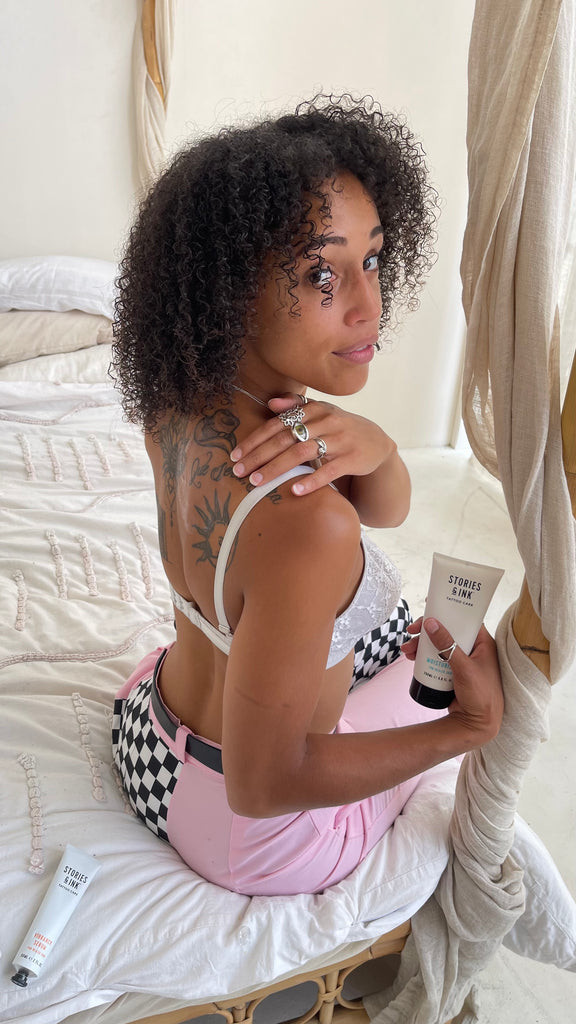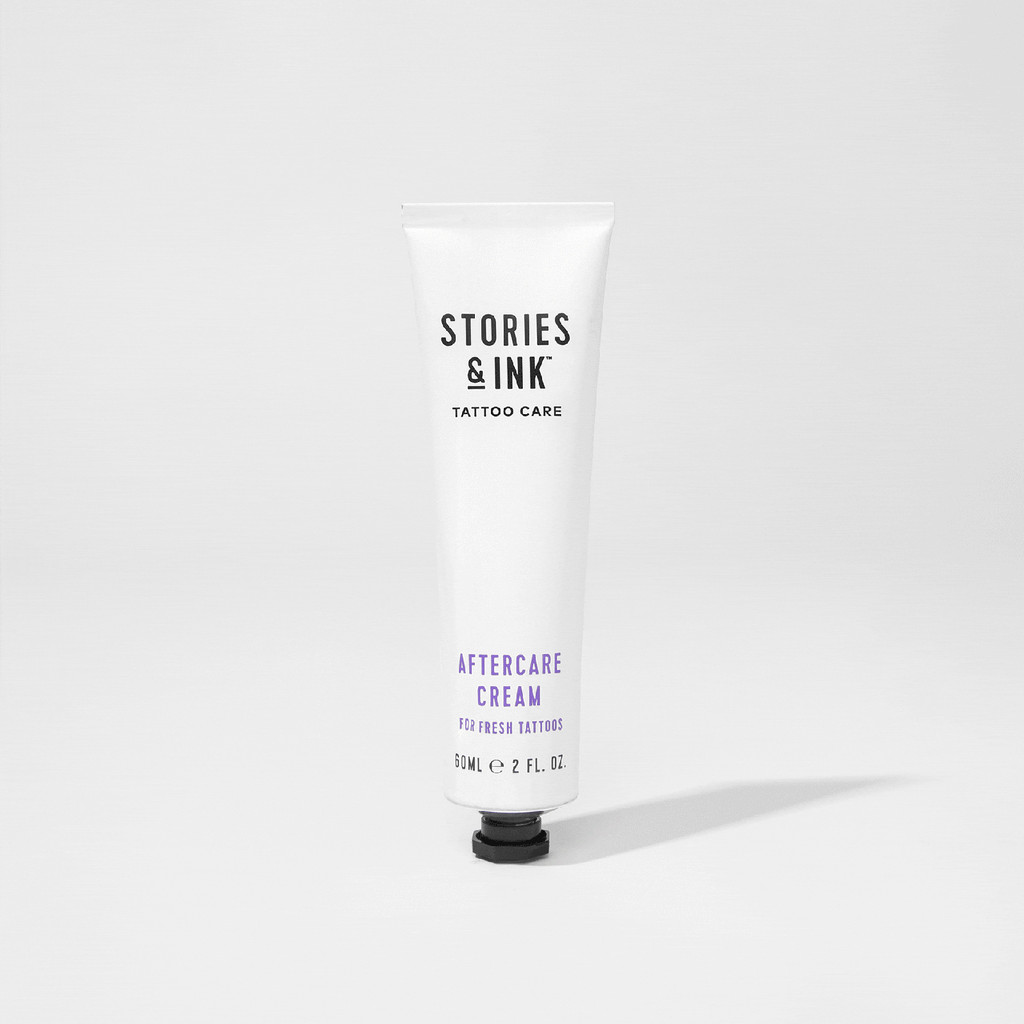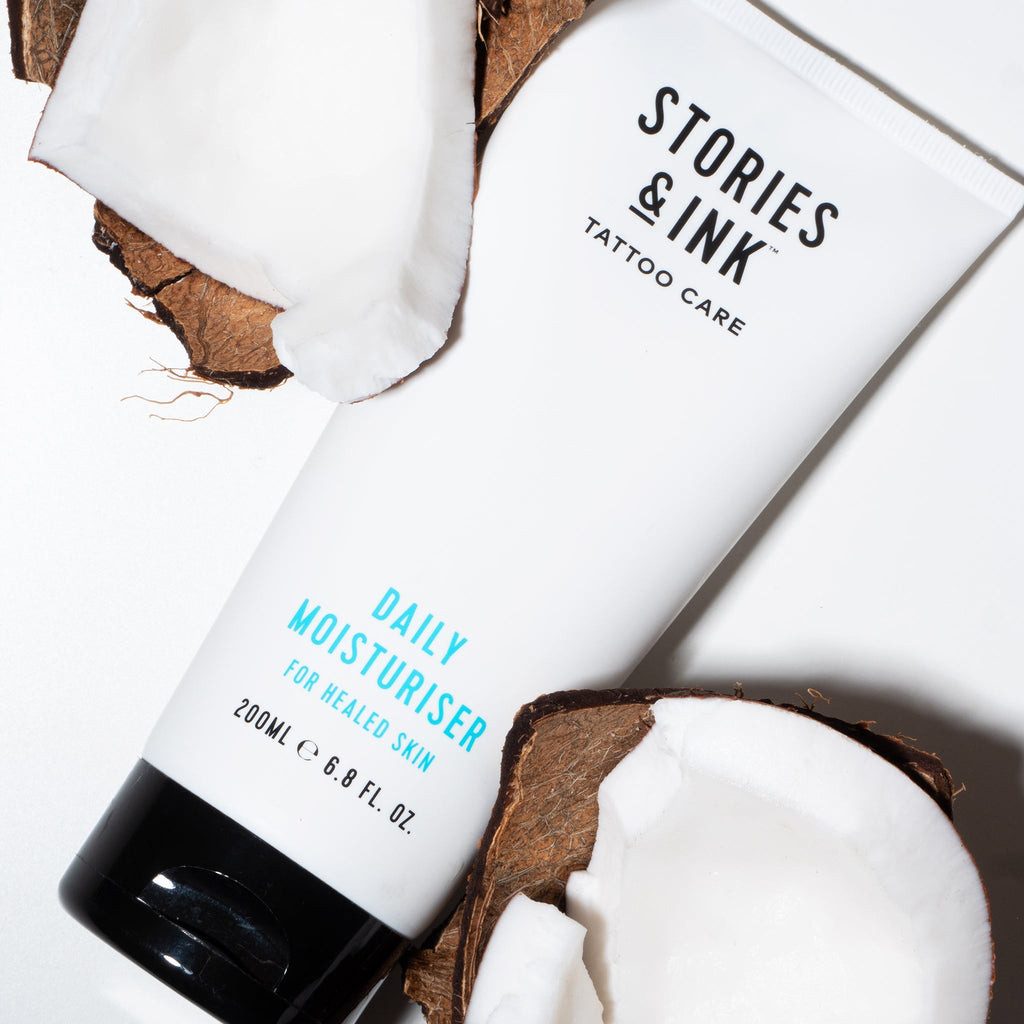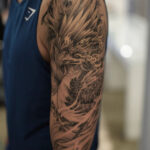Can You Slap Your Tattoo If It Itches? No, you should not slap your tattoo if it itches, as this can damage the healing skin, potentially leading to scarring or ink loss; instead, try patting or gently tapping the area to relieve the itch, and explore other aftercare methods. At tattooat.com, we understand the allure of a fresh tattoo and the challenges of the healing process, so let’s explore safe and effective ways to manage that irritating itch, ensuring your body art remains vibrant and healthy. Proper tattoo aftercare, moisturizing lotions, and cold compresses are key to soothing the skin.
1. Understanding Tattoo Itching
Tattoo itching is the irritating sensation that makes you want to scratch or rub the skin around a new or old tattoo. This is a very common part of the tattoo healing journey. As your skin repairs itself, it’s normal to experience this itch, which can vary in intensity from mild to super annoying. Knowing what causes the itch and how long it might stick around is key to managing it effectively.
1.1. What Causes Tattoo Itching?
Tattoo itching comes from a mix of factors. The most common are:
- Healing Process: When you get a tattoo, your skin is essentially injured. As it heals, it goes through phases like scabbing, peeling, and skin regeneration, all of which can cause itching.
- Immune Response: Your body sees tattoo ink as a foreign substance. This triggers an immune response, releasing histamines that can lead to itching.
- Dryness: New tattoos can dry out quickly, especially if not moisturized properly, causing the skin to itch.
- Irritants: Soaps, lotions, or clothing that are too harsh can irritate the tattooed area, making it itch.
- Allergic Reactions: In rare cases, an allergy to the tattoo ink itself can cause itching, redness, and swelling.
1.2. How Long Does Tattoo Itching Last?
How long your tattoo itches depends on a few things, like how big it is, where it’s located, and how well your body heals. Generally, you can expect itching to last for:
- First Week: The first few days after getting a tattoo often involve the most intense itching as the initial healing kicks in.
- One to Three Weeks: For most people, itching starts to calm down after the first week and is usually gone within one to three weeks.
- Longer Periods: Some tattoos, particularly larger or more intricate designs, might itch for longer as they take more time to fully heal.
 Woman applying tattoo aftercare cream
Woman applying tattoo aftercare cream
1.3. What Does It Mean if My Tattoo Is Itching After Years?
If your old tattoo starts itching after years, there are several reasons why this might be happening:
- Dry Skin: Dry skin is a common cause of itching in old tattoos. As skin loses moisture, it can become irritated, leading to itching.
- Allergies: Allergies to certain fabrics, soaps, or other environmental factors can cause the tattooed area to itch.
- Sun Exposure: Sun exposure can damage the skin and cause an inflammatory response, leading to itching.
- Skin Conditions: Skin conditions like eczema or psoriasis can affect tattooed areas, causing them to itch.
- Weather Changes: Changes in humidity and temperature can dry out the skin, leading to itching in old tattoos.
2. The Dangers of Slapping or Scratching Your Tattoo
While it might be tempting to slap or scratch an itchy tattoo, doing so can lead to serious problems. Here’s why you should resist that urge:
- Infection: Scratching breaks the skin, making it easy for bacteria to get in and cause an infection.
- Scarring: Aggressive scratching can damage the healing skin and lead to permanent scarring, which can ruin the tattoo’s appearance.
- Ink Loss: Picking at scabs or scratching can pull out the ink, leaving faded or patchy spots in your tattoo.
- Delayed Healing: Scratching disrupts the healing process, making it take longer for your tattoo to fully recover.
- Inflammation: Scratching can cause inflammation, leading to redness, swelling, and more itching.
2.1. Research on Tattoo Aftercare and Healing
According to research from Portland State University’s Art Department, in July 2025, proper aftercare significantly reduces the risk of complications. The study highlights that avoiding scratching and keeping the area moisturized are key to preventing infections and ensuring optimal healing.
3. Safe Ways to Relieve Tattoo Itching
When your tattoo starts to itch, don’t panic. Here are some safe and effective ways to get relief without causing damage:
- Patting: Gently patting the itchy area can provide relief without the risks of scratching.
- Cold Compresses: Applying a cold compress can numb the area and reduce itching.
- Moisturizing: Keeping the skin hydrated can prevent dryness and reduce itching.
- Loose Clothing: Wearing loose clothing can prevent irritation and friction, reducing itching.
- Topical Creams: Using a recommended tattoo aftercare cream can soothe the skin and relieve itching.
3.1. Detailed Guide on Soothing Your Itchy Tattoo
Let’s dive deeper into each of these methods to give you a complete guide on how to soothe that itch.
3.1.1. Pat, Don’t Scratch
Instead of scratching, try gently patting the itchy area. This can provide a similar sensation without damaging the skin. Use clean hands and pat lightly to avoid irritation.
3.1.2. Cold Compresses for Instant Relief
Applying a cold compress can quickly relieve itching. Wrap an ice pack in a clean cloth and apply it to the tattooed area for 10-15 minutes. The cold helps numb the skin and reduce inflammation.
3.1.3. The Power of Moisturizing
Keeping your tattoo moisturized is crucial. Dry skin can make itching worse, so apply a thin layer of fragrance-free, hypoallergenic lotion several times a day. Look for lotions specifically designed for tattoo aftercare.
3.1.4. Dress Comfortably
Wear loose, breathable clothing to avoid irritating your tattoo. Tight clothing can rub against the skin, causing friction and making the itching worse. Cotton fabrics are a great choice.
3.1.5. Topical Creams to the Rescue
There are many topical creams designed to relieve tattoo itching. Look for creams with ingredients like:
- Vitamin E: Helps to heal and protect the skin.
- Aloe Vera: Soothes and moisturizes the skin.
- Calendula: Has anti-inflammatory properties.
Always follow your tattoo artist’s recommendations or consult a dermatologist before using any new products on your tattoo.
 Stories & Ink tattoo aftercare cream
Stories & Ink tattoo aftercare cream
3.2. When to See a Doctor
While itching is usually a normal part of the healing process, sometimes it can indicate a more serious problem. See a doctor if you experience any of the following:
- Severe Pain: Intense pain that doesn’t subside.
- Swelling: Excessive swelling around the tattoo.
- Pus: Any discharge of pus from the tattoo.
- Redness: Spreading redness around the tattoo.
- Fever: A fever accompanied by tattoo itching.
- Allergic Reaction: Signs of an allergic reaction, such as hives or difficulty breathing.
4. Long-Term Tattoo Care to Prevent Itching
Taking care of your tattoo doesn’t stop once it’s healed. Here are some long-term care tips to keep your tattoo looking great and prevent itching:
- Stay Hydrated: Drinking plenty of water keeps your skin hydrated from the inside out.
- Moisturize Regularly: Keep moisturizing your tattoo even after it’s fully healed.
- Protect from the Sun: Sun exposure can fade your tattoo and cause itching.
- Avoid Harsh Chemicals: Stay away from harsh soaps and lotions that can irritate your skin.
- Exfoliate Gently: Gently exfoliating the area around your tattoo can remove dead skin cells and prevent itching.
4.1. The Importance of Sun Protection
Sun protection is key to preventing itching and fading in old tattoos. UV rays can damage the skin and cause inflammation, leading to itching. Here’s how to protect your tattoo from the sun:
- Sunscreen: Apply a broad-spectrum sunscreen with an SPF of 30 or higher to your tattoo whenever you’re outside.
- Clothing: Cover your tattoo with clothing when possible, especially during peak sun hours.
- Avoid Tanning Beds: Tanning beds emit harmful UV rays that can damage your tattoo.
4.2. Choosing the Right Moisturizer for Old Tattoos
Choosing the right moisturizer can make a big difference in preventing itching in old tattoos. Look for moisturizers that are:
- Fragrance-Free: Avoid fragrances, as they can irritate the skin.
- Hypoallergenic: Choose hypoallergenic products to reduce the risk of allergic reactions.
- Non-Comedogenic: Non-comedogenic moisturizers won’t clog pores.
- Rich in Emollients: Emollients like shea butter and cocoa butter can help to hydrate and soften the skin.
 Stories & Ink Daily Moisturiser
Stories & Ink Daily Moisturiser
5. Tattoo Itching and Allergies
Sometimes, itching can be a sign of an allergic reaction to the tattoo ink. Allergic reactions can occur even years after getting the tattoo.
5.1. Common Allergens in Tattoo Ink
Some common allergens found in tattoo ink include:
- Mercury Sulfide: Found in red ink.
- Cadmium Sulfide: Found in yellow ink.
- Chromium Oxide: Found in green ink.
- Cobalt Chloride: Found in blue ink.
If you suspect you’re having an allergic reaction to your tattoo ink, see a doctor or dermatologist right away.
5.2. How to Identify an Allergic Reaction
Signs of an allergic reaction to tattoo ink include:
- Persistent Itching: Itching that doesn’t go away with normal aftercare.
- Redness: Redness around the tattoo.
- Swelling: Swelling around the tattoo.
- Hives: Raised, itchy bumps on the skin.
- Blisters: Small, fluid-filled blisters on the tattoo.
5.3. Treatment Options for Tattoo Allergies
Treatment options for tattoo allergies include:
- Topical Corticosteroids: Creams that reduce inflammation and itching.
- Oral Antihistamines: Medications that relieve itching and hives.
- Allergy Testing: Identifying the specific allergen causing the reaction.
- Laser Tattoo Removal: In severe cases, removing the tattoo may be necessary.
6. Lifestyle Factors That Affect Tattoo Itching
Certain lifestyle factors can also affect tattoo itching. Being aware of these factors can help you manage itching more effectively.
6.1. Diet and Hydration
What you eat and drink can impact your skin’s health and hydration levels.
- Hydration: Drinking plenty of water keeps your skin hydrated and less prone to itching.
- Balanced Diet: A diet rich in vitamins and minerals supports healthy skin.
- Omega-3 Fatty Acids: Foods rich in omega-3 fatty acids can help reduce inflammation.
6.2. Stress Management
Stress can trigger skin problems and make itching worse. Managing stress through relaxation techniques can help.
- Meditation: Practicing meditation can reduce stress and improve overall well-being.
- Yoga: Yoga combines physical postures, breathing exercises, and meditation to reduce stress.
- Hobbies: Engaging in hobbies can provide a distraction and reduce stress levels.
6.3. Environmental Factors
Environmental factors like humidity and temperature can also affect tattoo itching.
- Humidity: Low humidity can dry out the skin, leading to itching.
- Temperature: Extreme temperatures can irritate the skin and cause itching.
- Pollution: Exposure to pollution can irritate the skin and trigger itching.
7. Tattoo Styles and Itching
Different tattoo styles and techniques can also influence how much a tattoo itches during the healing process.
7.1. Line Work vs. Shading
- Line Work: Tattoos with intricate line work may heal faster and itch less because they involve less trauma to the skin.
- Shading: Tattoos with heavy shading can take longer to heal and may itch more due to the larger area of skin affected.
7.2. Color vs. Black and Gray
- Color Tattoos: Color tattoos, especially those with red ink, may be more prone to allergic reactions and itching.
- Black and Gray Tattoos: Black and gray tattoos are generally less likely to cause allergic reactions and may itch less.
7.3. Placement Matters
The location of your tattoo can also affect how much it itches. Areas with more friction or movement, such as joints, may be more prone to itching.
8. Dispelling Common Myths About Tattoo Itching
There are many myths and misconceptions about tattoo itching. Let’s set the record straight.
- Myth: Itching Means the Tattoo Is Infected: While itching can be a sign of infection, it’s usually just a normal part of the healing process.
- Myth: Scratching Is Okay If You Do It Gently: Even gentle scratching can damage the skin and increase the risk of infection.
- Myth: All Tattoo Itching Is the Same: The causes and intensity of itching can vary depending on individual factors and tattoo characteristics.
9. Real-Life Experiences with Tattoo Itching
Hearing from others who have experienced tattoo itching can be helpful and reassuring.
9.1. Personal Stories
- Sarah’s Story: “My first tattoo itched like crazy for two weeks. I thought I was going to lose my mind! Cold compresses and moisturizing were my saviors.”
- Mark’s Story: “I scratched my tattoo without thinking and ended up with an infection. It was a nightmare. Learn from my mistakes and don’t scratch!”
- Emily’s Story: “I found that wearing loose clothing made a huge difference in reducing the itching. Cotton is your best friend.”
9.2. Expert Advice from Tattoo Artists
Leading tattoo artist, Anika from Portland, OR says, “Moisturizing is key! It not only alleviates the itch but also keeps the colors vibrant as the tattoo heals. I always recommend fragrance-free lotions to my clients.”
10. Tattooat.com: Your Resource for Tattoo Care
At tattooat.com, we are dedicated to providing you with the best information and resources for tattoo care. Whether you’re looking for design ideas, artist recommendations, or aftercare tips, we’ve got you covered.
10.1. Explore Tattoo Designs
Find inspiration for your next tattoo with our extensive collection of designs. From traditional to modern styles, we have something for everyone.
10.2. Find a Tattoo Artist
Connect with talented tattoo artists in your area. Our directory features artists specializing in various styles and techniques.
10.3. Learn About Tattoo Aftercare
Access our comprehensive guides on tattoo aftercare. Learn how to properly care for your new tattoo and prevent complications.
Navigating the itchiness of a new tattoo is part of the journey, but with the right knowledge and care, you can ensure your body art heals beautifully. Remember, resist the urge to slap or scratch, and instead, embrace gentle and effective methods to soothe your skin.
Ready to dive deeper into the world of tattoos? Visit tattooat.com now to discover stunning designs, find skilled artists, and learn everything you need to know about tattoo aftercare. Your perfect tattoo experience starts here.
FAQ: Tattoo Itching
1. Why Does My New Tattoo Itch So Much?
New tattoos itch due to the skin’s natural healing process, which includes scabbing, peeling, and regeneration.
2. Can I Slap My Tattoo If It Itches?
No, slapping your tattoo can damage the healing skin and lead to complications like scarring or ink loss.
3. How Long Will My Tattoo Itch?
Tattoo itching typically lasts between one to three weeks, but it can vary depending on the individual and the size of the tattoo.
4. What’s the Best Way to Relieve Tattoo Itching?
Gently patting the area, applying cold compresses, moisturizing regularly, and wearing loose clothing can relieve itching.
5. Is It Normal for Old Tattoos to Itch?
Yes, old tattoos can itch due to dry skin, allergies, sun exposure, or skin conditions.
6. What Should I Do If My Old Tattoo Is Itching?
Moisturize regularly, avoid harsh chemicals, protect from sun exposure, and consider antihistamines if the itching is severe.
7. Can Tattoo Ink Cause Allergies?
Yes, some tattoo inks contain allergens that can cause itching, redness, and swelling.
8. How Can I Prevent Tattoo Itching?
Stay hydrated, moisturize regularly, protect from the sun, avoid harsh chemicals, and manage stress.
9. When Should I See a Doctor for Tattoo Itching?
See a doctor if you experience severe pain, swelling, pus, redness, fever, or signs of an allergic reaction.
10. Where Can I Find More Information About Tattoo Care?
Visit tattooat.com for comprehensive guides, design ideas, and artist recommendations.
